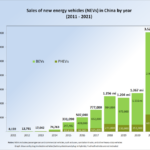State officials propose capping profits of gasoline companies
- Gasoline prices in California have surpassed $5 per gallon
- State officials are considering capping the profits of gasoline companies
- Chevron and other producers are opposing the move
- California’s transition to cleaner transportation fuels is posing challenges
- Gasoline car sales will be banned in California by 2035
Gasoline prices in California have skyrocketed, reaching over $5 per gallon, while the national average remains around $3.61. To provide relief to drivers, state officials are considering a unique approach—capping the profits of gasoline companies. However, Chevron and other top producers are opposing this move, arguing that it could lead to even higher prices. California’s transition to cleaner transportation fuels has been successful in many ways, but the road ahead is challenging. The state’s efforts to lower gas prices highlight the complexities of winding down the oil industry. The California Energy Commission will decide on implementing a margin cap and penalties by the end of the year. While California has always had higher gas prices due to various factors, the gap has widened recently. The state’s premium prices are particularly evident during times of crisis. California’s gas prices are influenced by higher taxes, environmental regulations, a scarcity of refiners and independent gas stations, and an unexplained additional surcharge. The state believes that oil companies have no incentive to mitigate these price spikes, leading to better profits for the companies. Chevron argues that its margins in California are similar to other states, but the cost of doing business in the state is higher. California’s unique fuel blend and limited supply options contribute to its isolated market. The state’s transition to renewable diesel and the closure of refineries have further reduced supply options. Additionally, a ‘mystery gasoline surcharge’ in California adds to the price disparity. This surcharge is believed to be related to marketing, transportation, retailing, and possibly refining. Branded stations, which sell Chevron’s special formulation of gas, are more expensive than generic ones. California has fewer independent stores, leading to less competition and higher profits for existing operators. Despite the challenges, California aims to ban gasoline car sales by 2035.·
Factuality Level: 3
Factuality Justification: The article provides a detailed overview of the situation regarding gasoline prices in California, including the factors contributing to the high prices, the proposed solutions, and the perspectives of various stakeholders. However, the article lacks depth in analyzing the potential impacts of the proposed regulations and presents some information without sufficient evidence or context.·
Noise Level: 3
Noise Justification: The article provides a detailed analysis of the factors contributing to high gas prices in California, including the state’s transition to cleaner fuels, the impact of regulations and taxes, and the dynamics of the gasoline market. It explores the potential consequences of capping gasoline profits and the challenges faced by consumers and industry players. The article supports its claims with data and quotes from relevant sources, offering insights into the complex issues surrounding gas prices in California.·
Public Companies: Chevron (CVX), Marathon Petroleum (MPC), Valero Energy (VLO), PBF Energy (PBF), Phillips 66 (PSX)
Key People: Andy Walz (President of Chevron’s Americas Products business), Joe Lombardo (Nevada Governor), Gavin Newsom (California Governor), Kevin Slagle (Spokesman for the Western States Petroleum Association), Severin Borenstein (Energy economist at Berkeley’s Haas School of Business), Tom Kloza (Global head of energy analysis at OPIS)
Financial Relevance: Yes
Financial Markets Impacted: Gasoline producers and refiners in California
Financial Rating Justification: The article discusses the potential cap on profits for gasoline companies in California, which could impact their financial performance and potentially lead to changes in gasoline prices. It also highlights the challenges and dynamics of the gasoline industry in California, which could have implications for financial markets and companies operating in the state.·
Presence Of Extreme Event: No
Nature Of Extreme Event: No
Impact Rating Of The Extreme Event: No
Extreme Rating Justification: ·
 www.marketwatch.com
www.marketwatch.com 





